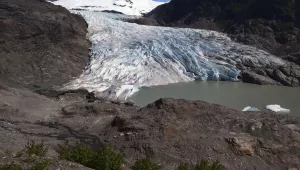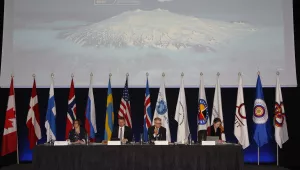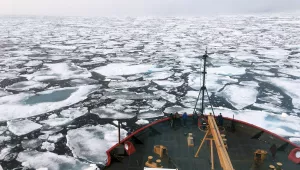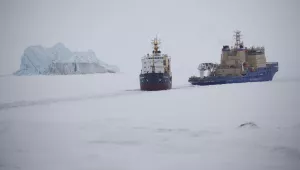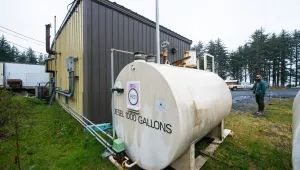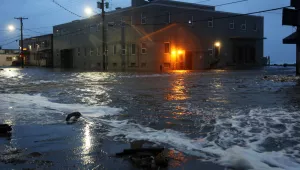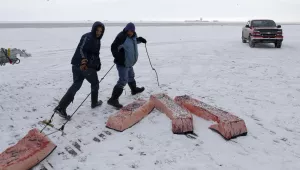In May 2023, the Arctic Initiative hosted a workshop in partnership with the Science and Technology Directorate of the U.S. Department of Homeland Security (DHS). The focus was on the challenges posed by the impacts of rapid climate change in Alaska; how DHS and its components— including the Federal Emergency Management Agency (FEMA), the Cyber and Infrastructure Security Agency (CISA), and the U.S. Coast Guard (USCG)—are addressing them; and what possibilities may exist for DHS to do more and better.
The workshop represented an opportunity for Arctic Initiative experts, as well as partners from Woodwell Climate Research Center, the Alaska Institute for Justice, and Alaska Native organizations, to provide analysis and recommendations to the federal government to inform policies for combating the climate crisis in the U.S. Arctic. The Arctic Initiative published a summary of the workshop’s findings on ocean issues, infrastructure, human health and security, and cross-cutting science and technology solutions. DHS’ Science and Technology Directorate later produced a report based on the workshop and their further considerations.
Workshop participants emphasized that the accelerating effects of climate change, such as extreme weather events and permafrost thaw, are inflicting serious damage on the region’s already limited infrastructure. The damage is affecting the region’s economy, the stability of long-established and important communities, and the physical and cultural health and well-being of residents. The damage is also hampering disaster relief efforts and adding to the cost of mitigating and preventing further damage. There will continue to be widespread destruction of local communities requiring large-scale rebuilding, and in some circumstances, the wholesale relocation of residents.
The retreat of Arctic sea ice is opening previously inaccessible areas of the Arctic Ocean to navigation and resource extraction. This will constitute a growing challenge for environmental protection, the regulation of commerce, and border security. These new challenges have exposed gaps in communications, weather monitoring, and situational awareness in the U.S. Arctic region.
Many of the impacts of climate change within the region fall especially hard on Alaska Native communities. Representatives from Alaska Native organizations and the Alaska Institute for Justice shared how numerous at-risk villages are deciding whether to invest in adaptation in place or relocate some or all of their populations. However, affected communities have historically encountered significant limitations when attempting to utilize government support for responding to climate-induced disasters. For instance, in the wake of Typhoon Merbok, barriers to accessibility prevented many villages from receiving prompt assistance, and despite a low number of applications for funding, there were high denial rates for the Individual Assistance Program.
Central to the discussion was how DHS could include slow-onset disasters within its emergency response capacities. Participants identified a need to review the Stafford Act and other relevant policies to determine where responsibilities for dealing adequately with slow-moving disasters belong and what policy changes are needed to remedy current shortfalls. Currently, FEMA is only authorized to respond to sudden crises; its protocols require a reported start and end date, which does not account for many climate issues facing the region. In response, the agency is prioritizing coordination with Indigenous communities to improve disaster response and put equity at the center of emergency management. The White House Community-Driven Relocation Subcommittee, co-led by FEMA, is focusing on addressing the relocation challenges faced by communities in need that have already been identified. CISA is working to develop and apply technology-based approaches for addressing challenges specific to rapid climate change, including adaptive risk-management solutions.
The workshop emphasized the need for interagency collaboration to fill many of the gaps that currently exist in Federal responses to rapid climate change in Alaska. Local and Indigenous knowledge must be integrated with science, technology, and innovation to develop community-based adaptation mechanisms to address the current effects of warming and prepare for future impacts.
Hanlon, Elizabeth. “Advising Federal Responses to Rapid Climate Change in Alaska.” Belfer Center for Science and International Affairs, September 28, 2023

